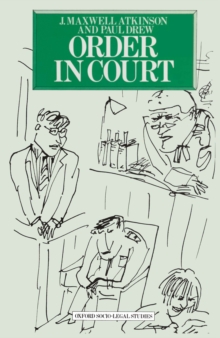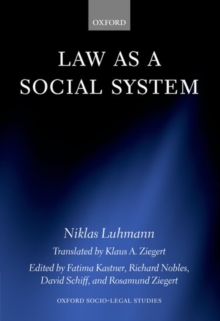
Law as a Social System Paperback / softback
by Niklas (, Prior to his death in 1998, Niklas Luhmann was Emeritus Professor of Sociology at Luhmann
Edited by Fatima (Associate Lecturer, University of Hamburg Institute of Social Sciences) Kastner, Richard (Reader in Law, London School of Economics and Political Science) Nobles
Part of the Oxford Socio-Legal Studies series
Paperback / softback
Description
Modern systems theory provides a new method for the analysis of society through an examination of the structures of its communications.
In this volume, Niklas Luhmann, the theory's leading exponent, explores its implications for our understanding of law. Luhmann argues that current thinking about how law operates within a modern society is seriously deficient.
He lays out the theoretical and methodological tools that, he argues, can advance our understanding of contemporary society and in particular of the identity, performance, and function of the legal system within that society.
In systems theory, society is its communications: they are its empirical reality; the items that can be observed and studied.
Systems theory identifies how communications operate within a physical world and how different sub-systems of communication operate alongside each other. In this volume, Luhmann uses systems theory to address a question central to legal theory: what differentiates law from other social practices?
However, unlike conventional legal theory this volume seeks to provide an answer in terms of a general social theory: a methodology that answers the question in a manner applicable not only to law, but also to all the other complex and highly differentiated systems within modern society, such as politics, the economy, religion, the media, and education.
This sociological approach offers profound insights into the relationships between law and other social systems.
Information
-
Out of stock
- Format:Paperback / softback
- Pages:512 pages
- Publisher:Oxford University Press
- Publication Date:19/06/2008
- Category:
- ISBN:9780199546121
Information
-
Out of stock
- Format:Paperback / softback
- Pages:512 pages
- Publisher:Oxford University Press
- Publication Date:19/06/2008
- Category:
- ISBN:9780199546121










